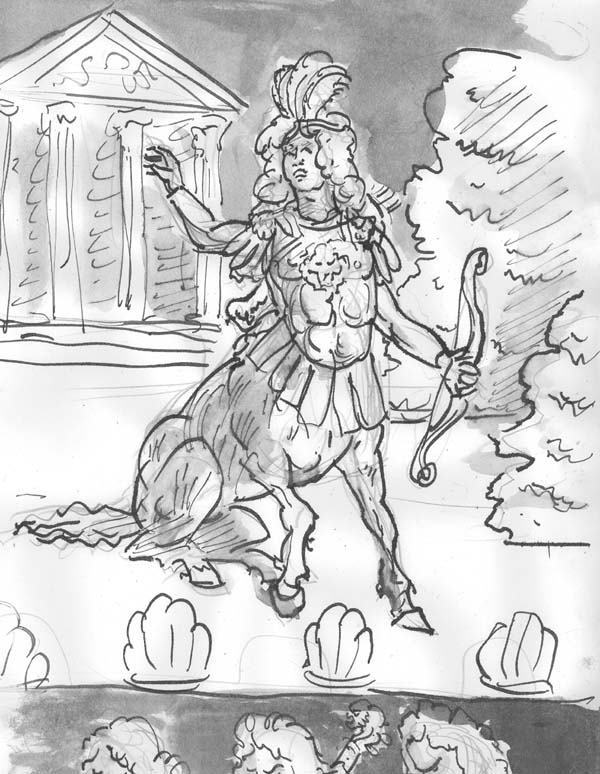 |
 |
PORTRAIT SKETCH OF CILLARO ZOCCOLETTI (1699 - 1744) In the annals of operatic history, few careers have been as brilliant, brief and unjustly neglected , as that of Zoccoletti, once celebrated as the "Celestial Gelding". Born the son of a cordwainer, in a small Centaur village in the Piemonte region of Italy, Cillaro showed signs of musical talent at an early age. His singing voice was so fine and pure that his parents were persuaded to enter him into the choir of the local parish when he was only five. Under the tutelage of the music master, he rapidly advanced in technique; and soon his singing was renowned among the several neighboring villages as well. Unfortunately (or so the story goes), he suffered a terrible accident at the age of nine. While playing with his coltish friends, Cillaro attempted to jump an extremely tall thorn hedge in back of the Rectory; he was not successful. The lacerations from his fall were so severe that he was taken to the veterinarian, who was obliged (medical knowledge being what it was in those times) to perform emergency surgery to save his patient's life. Thereafter, Cillaro Zoccoletti was a gelding. Upon his recovery, it was agreed between his parents and the parish priest, that he should remain with the choir; and indeed, he continued to progress with his musical training until, at the age of thirteen, he was sent to the prestigious choir of S. Epona in Rome, by order of the Bishop. As a chorister, and occasional soloist, he gained experience, and drew the admiration of churchgoers with his vocal abilities. At the age of seventeen, he attracted the attention of the director of the Teatro Dionisio, who was looking for operatic talent; the church officials (for a reasonable compensation) allowed Zoccoletti to be apprenticed to the stage. He spent several years more in learning the dramatic arts; until, in the summer of 1720, he made his public debut in the role of Chirone in Rinardi's l'Educazione di Achille. The production was an immediate success among Human operagoers. Not only was it a great novelty to have a Centaur singing onstage; but Zoccoletti possessed a voice superior to any of the reigning castrati of the time. His range was unequaled; and, thanks to his double pair of lungs, he could command a volume and endurance that put any other voice to shame. At the opening performance, he was heard to hold the B flat above high C, during the cadenza in the aria "Pone l'Arco", for a full two minutes by the prompter's watch. (The sketch displayed above was made by an eyewitness to one of these performances; and is reproduced by kind permission of the Centaurological Museum of Pelion-upon-Ossa, Kent.) Zoccoletti had arrived. Within days, he was the toast of Rome; and the music world ( as well as the fashionable portion of the fair sex) was worshiping at his hooves. How he soon came to disappointment, and later fell into oblivion, will be told in the next item... |


